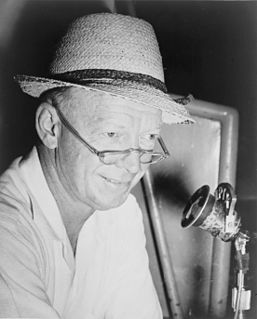A Quote by Red Barber
When I'm talking to a large audience, I imagine that I'm talking to a single person.
Quote Topics
Related Quotes
She [Hillary Clinton] knows the people well. I think there is - you know, also talking about breaking down barriers and talking about that, whether we`re talking about that in economic terms. I mean, she`s the only person who has been out there talking about white privilege and talking about sort of the intersectionality of some of these issues.
It's a very, very interesting experience to be talking to people who are such icons in their own right. When Adele came to a show, I was just talking to her, and at the time, I thought, 'I'm just having a chat with somebody.' But then I heard myself say, 'Oh, I was talking to Adele the other day,' and it's as strange as you'd imagine.
I think one of the highest compliments you can give a person is that when you are talking to him, you are not thinking about the fact that you are talking to him. That is, your thoughts and words all exist on a single, engaged level. You are being yourself because you aren't bothering to think about who you should be. It is like when you talk in a dream.
The thing I always guard against when I'm talking to people I'm working with about a script is that there's a thing I don't like and it's called "talk story." It's when you're talking about the story; the characters are tasked with talking about the story instead of allowing the audience to experience the story.
When you're at the basketball court watching a game, one person may be talking about a fight he had with his wife, another is talking about the last hard-on he got, someone else is talking about the presidential election. The language and the tone and the voice - I'd love to be able to capture that spontaneity.


































